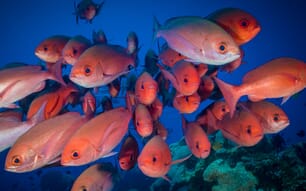William Muir, a professor of animal sciences, said that based on data made available by the US Food and Drug Administration, AquAdvantage (AA) salmon poses little real risk to the environment or human health.
AA salmon were given a gene from Chinook salmon that speeds growth and improves feed efficiency in farm-raised fish. Developed by AquaBounty Technologies, the fish would be spawned in Canada and grown to full size in Panama, both of which are land-based, contained facilities.
"We realise that any new technology can have risks, and those risks need to be assessed in a thorough and convincing manner," Mr Muir said.
"However, once the assessment has been completed and the agency concludes from the weight of evidence that risks of harm, either to the environment or to consumers, is negligible, the next step, which is to allow production and sale of the product, needs to be taken."
Mr Muir and Alison L. Van Eenennaam, an animal genomics and biotechnology Extension specialist at the University of California Davis, made the call for FDA approval in a peer-reviewed commentary in the early online version of the journal Nature Biotechnology.
The salmon would be the first GE animal used as a food in the US, but it has been tied up in FDA regulatory proceedings since 1995. Mr Muir said that becomes a disincentive for those working to increase food supplies for a growing world population.
"This tells us that no entrepreneur is going to invest in these new projects because they can't get them approved," Mr Muir said.
Mr Muir has not received any funding or support from AquaBounty Technologies.
Alan Mathew, head of Purdue's Department of Animal Sciences, served on the FDA's Veterinary Medicine Advisory Committee, which did not find any significant concerns for AA salmon. He said after considering the issues, he was convinced that the genetically engineered salmon is safe.
"We determined there was not added risk. This is generally the same food as farm-raised and wild salmon," Mr Mathew said.
Mr Mathew said crops and animals have been selected for favorable traits for centuries, keeping the value-added genes and eliminating unfavorable ones. He said genetic engineering simply shortens the time it takes to gain those favorable traits.
"Our methods are doing it more strategically rather than randomly," Mr Mathew said.
The commentary goes point by point to refute concerns raised by special interest groups over GE salmon.
One of the most significant environmental concerns about GE salmon is that if they were introduced into the wild salmon population, they would cause its extinction. This is a theoretical scenario discovered earlier by Mr Muir, which he termed the Trojan gene effect. However, Mr Muir examined fitness data and concluded that AA salmon are less fit than their native counterparts, meaning that natural selection would simply purge them from the wild population.
"The Trojan gene effect does not apply in this case, and there is no evidence to support concern for an extinction event," Mr Muir said.
Mr Muir also points out that AquaBounty has developed multiple redundant safeguards to prevent the fish from entering natural populations.
First, only triploid eggs which have three copies of each chromosome - would be sent to Panama from Canada. That means 99.7 per cent of the fish are sterile. All the fish would also be female, unable to breed with each other.
Second, the facility in Panama is land-based, with screens to keep the salmon inside. Panama was chosen as the farming site because its waters are tropical. If fertile AA salmon were able to escape the holding barriers, they would perish when reaching water too warm for their survival.
Finally, in the unlikely event that fertile fish escaped and survived in the surrounding oceans, they would have to swim several thousand miles to find possible spawning streams and mates.
Regarding human health concerns, AA salmon were said to have more allergens than non-GE salmon. This raised concerns that consuming the GE versions could harm people.
But the data did not support this assertion. Muir said there is no baseline for the amount of allergens a fish may contain before it is unsafe for consumption and that many fish consumed regularly, such as herring, have significantly more allergens than AA salmon.
"There is as much as a hundredfold difference in the allergenicity among fish," Mr Muir said. "At what level should it trigger concern?"
Mr Muir also argues that the FDA will treat AA salmon like a new drug that has been through the regulatory process. The agency can approve and continue to monitor the salmon. If new concerns are raised and found to be valid, the government could withdraw its approval.
Further Reading
|
| - | Go to our previous news item on this story by clicking here. |



